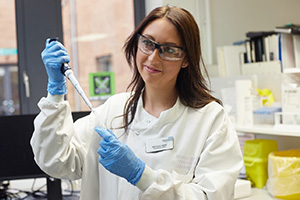Michelle Frost talks about using Biomedical Science to help keep people safe
Michelle used her healthcare science skills and knowledge to help people who think they've had their drinks 'spiked'.
- Programme
- Healthcare Science
- Role
- Healthcare Science
As a Biomedical Scientist, I continually believe in improving patient care. When there was lots of media focus on a recent increase in spiking incidents, I realised by working in toxicology that we could help people who may have been spiked.
I came up with the idea after a night out with a colleague when my drink ‘disappeared’ only for it to re-appear minutes later. Because of my job I am aware of the dangers of spiking and refused to drink my cocktail. As I was leaving, I asked the security team about spiking and they said even if you did suspect you’d been spiked, you would never be able to find out. This made me think that this test should be available to everyone and not just me because I happen to work in a hospital and have access to the technology to run testing.
I created a collection kit that allows samples to be collected within a bar or club, which we can then safely transport back to the lab so there is no time delay. The lab at Norfolk and Norwich University Hospital (NNUH) joined forces with Norfolk Constabulary, the SOS Wellbeing bus, selected clubs and bars, and the University of East Anglia (UEA) to offer anti-spiking kits. Anyone who thinks they (or a friend) have been spiked can ask at the bar or in UEA dorms for a kit to provide a urine sample/drink sample/injection site swab, which is submitted to the NNUH lab for testing. After launching the Anti-Spiking campaign, it was identified by the Home Affairs Select Committee on Spiking, and received local and national media attention.
Although I had an unusual route to biochemistry having worked in several differing jobs such as photographer and HR and Payroll for different organisations outside the NHS, I always knew I wanted to work in a career where I could directly improve patient care.
I always had a real interest in science, so I did an online MSc degree and started volunteering at NNUH while working finance and payroll for a charity preschool, and working evenings in the local pub. I eventually got a permanent job as a Band 4 Associate Practitioner, now I am a specialist Band 6.
I hope this campaign makes a real difference. It has been exciting, and it is a hugely important campaign as we aim to learn more about spiking so we can better tackle it together.
